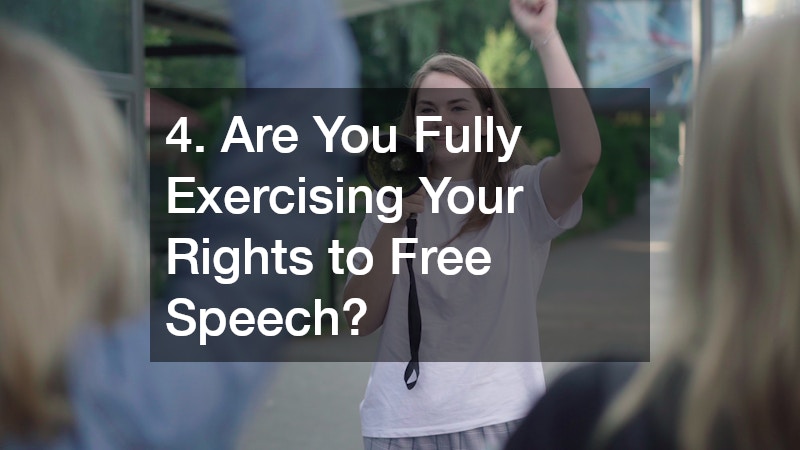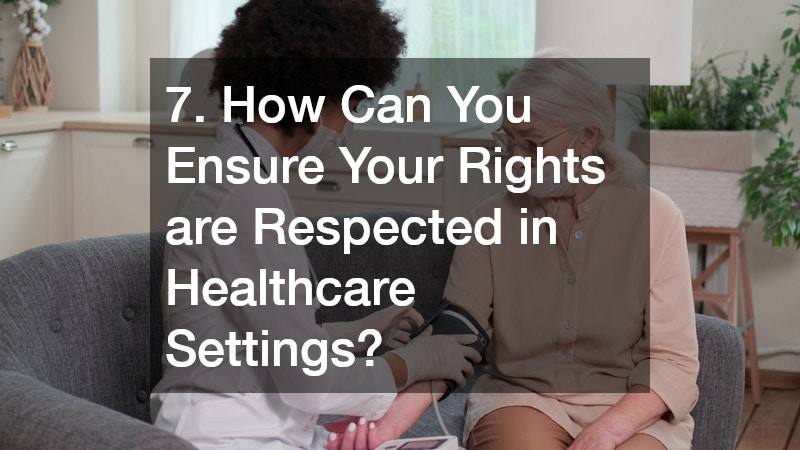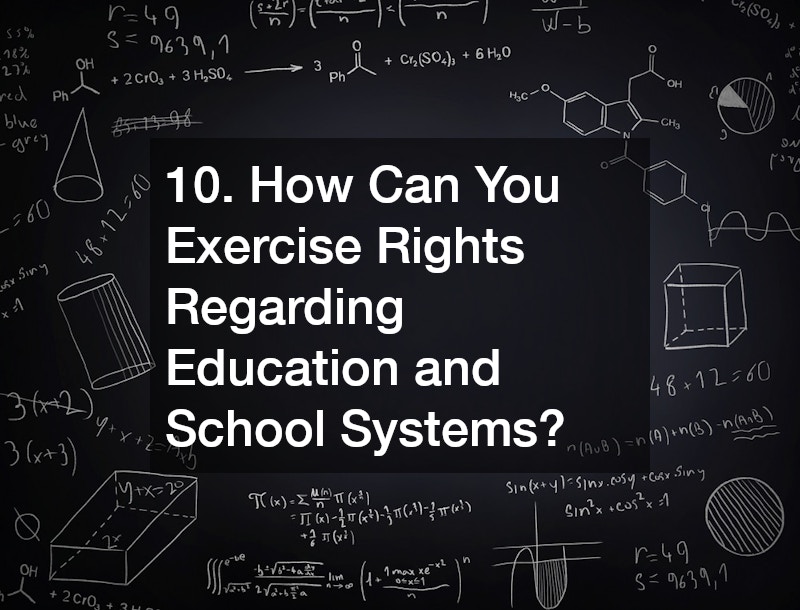In the fast-paced environment we live in, understanding and exercising your rights has never been more crucial. Whether you’re dealing with legal issues or everyday interactions, knowing your rights protects your personal liberties and enables you to make informed decisions. Too often, people find themselves disadvantaged not because they lack choices, but because they were unaware of the protections and resources available to them.
Knowledge of your rights empowers you to confidently navigate stressful or uncertain circumstances, from encounters with law enforcement to negotiations in the workplace. It can shield you from exploitation, reduce the risk of unfair treatment, and help you make choices that align with your best interests.
This article explores ten everyday scenarios where knowing and exercising your rights can make a meaningful difference. These examples—ranging from traffic stops and workplace discrimination to healthcare and digital privacy—highlight how awareness turns uncertainty into empowerment. By the end, you’ll have a comprehensive framework to better protect your freedoms and advocate for yourself in diverse areas of life.
- 1. Do You Know Your Rights During a Traffic Stop?
- 2. Are You Exercising Your Rights When Facing Workplace Discrimination?
- 3. How Can You Protect Your Rights Against Unlawful Surveillance?
- 4. Are You Fully Exercising Your Rights to Free Speech?
- 5. What Rights Do You Have When Detained by the Police?
- 6. Are You Exercising Your Rights When Buying Property?
- 7. How Can You Ensure Your Rights are Respected in Healthcare Settings?
- 8. What Are Your Rights When Protesting?
- 9. Are You Exercising Your Rights in Digital Spaces?
- 10. How Can You Exercise Rights Regarding Education and School Systems?
1. Do You Know Your Rights During a Traffic Stop?

Traffic stops are among the most common interactions people have with law enforcement, yet they can be nerve-wracking. Whether you’re pulled over for speeding, a broken taillight, or a routine checkpoint, knowing your rights is critical to keeping the situation under control.
First and foremost, remain calm. Officers will usually ask for your license, registration, and proof of insurance—items you are legally required to provide. Beyond that, however, you have the right to remain silent. You don’t need to answer questions about where you’re going, where you live, or your immigration status. Calmly stating, “I choose to remain silent,” is within your rights.
You also don’t have to consent to a search of your car. If an officer asks, you can politely say, “I do not consent to a search.” Unless the officer has probable cause (such as the smell of drugs) or a warrant, they cannot legally search your vehicle. Many drivers don’t realize this and inadvertently give up an important protection.
Think of consulting a naturalization lawyer or any legal expert as a broader reminder: knowledge of your legal status, whether in immigration, civil, or criminal law, equips you to navigate these interactions without panic.
2. Are You Exercising Your Rights When Facing Workplace Discrimination?
Workplaces are meant to be environments of equal opportunity, but discrimination remains a reality for many. Knowing your rights here can protect your career, your reputation, and your mental well-being.
Discrimination can occur in obvious ways—such as unequal pay for the same role—or in subtler forms, such as being excluded from projects due to gender, age, or race. If you feel you are being treated unfairly, begin by documenting everything. Keep emails, note incidents with times and dates, and gather witness accounts if possible. Documentation creates a foundation if you need to escalate the issue.
Employers are legally required to maintain nondiscriminatory practices under laws enforced by the Equal Employment Opportunity Commission (EEOC). Filing a complaint through the EEOC is a protected action, meaning your employer cannot retaliate against you for doing so.
In complex cases, consulting an employment lawyer is invaluable. Just as you might rely on the best divorce lawyer for guidance in family disputes, an attorney specializing in workplace rights ensures you know your options and protections. Exercising your rights here isn’t just about fairness for yourself—it can set precedents that protect others as well.
3. How Can You Protect Your Rights Against Unlawful Surveillance?
With technology woven into nearly every aspect of life, unlawful surveillance has become a serious concern. Protecting your rights here means knowing the difference between legal monitoring and illegal intrusion.
For example, cameras in public areas are generally permissible, but recording you in a private setting without your consent is often unlawful. Similarly, employers may monitor work emails or devices, but covertly tracking personal communications may cross legal lines.
Protecting yourself starts with awareness. Secure your digital presence by using strong, unique passwords, enabling two-factor authentication, and regularly updating privacy settings on devices and social media. Being proactive reduces the chance of unauthorized surveillance.
If you suspect you’re being monitored unlawfully, seek legal guidance. Just as a car accident attorney would represent you in a collision claim, privacy law attorneys specialize in defending individuals against violations of their personal freedoms. Exercising your rights in this area is essential to preserving autonomy in an increasingly monitored world.
4. Are You Fully Exercising Your Rights to Free Speech?

Free speech is one of the most celebrated rights, yet many misunderstand its scope. While you are entitled to express your opinions, there are boundaries—especially when speech could harm others or when you’re in private settings.
In public forums such as parks or town halls, your rights are broad. However, private platforms like social media companies can impose rules and restrict certain content. Similarly, workplaces often have policies governing employee speech, and violating them may result in disciplinary action without necessarily breaching free speech laws.
Knowing these distinctions empowers you to speak confidently while avoiding unintended consequences. If you face censorship in a space where your rights should be protected, legal avenues exist to challenge the suppression.
As personal injury lawyers demonstrate in their field, having expert guidance can help you determine whether a violation has occurred and what steps to take. Free speech thrives when individuals know both the power and limits of their rights.
5. What Rights Do You Have When Detained by the Police?
Being detained can feel intimidating and disorienting. Yet this is precisely when knowledge of your rights becomes most valuable.
If you are detained, you have two primary protections: the right to remain silent and the right to an attorney. You are under no obligation to answer questions beyond identifying yourself. Politely saying, “I would like to remain silent and speak to a lawyer,” prevents unintentional self-incrimination.
Police cannot hold you indefinitely without cause. If you ask, “Am I free to go?” and the officer says yes, you are not legally detained. If the answer is no, then you are being held, and your rights kick in even more strongly.
In situations where rights are violated—such as unlawful searches or excessive force—consulting with a criminal attorney may be necessary. Exercising your rights in this moment protects not just your freedom but also ensures accountability from those in power.
6. Are You Exercising Your Rights When Buying Property?
Property transactions involve complex contracts, regulations, and negotiations. Without exercising your rights, you risk entering agreements that are unfair or even fraudulent.
Before buying, you have the right to full disclosure. Sellers must reveal issues like structural problems, environmental hazards, or disputes tied to the property. If these are hidden, you may have legal grounds to rescind the contract or seek compensation.
You also have the right to review all contracts before signing. Never feel pressured to rush—take time to understand each clause, and don’t hesitate to ask for clarification. Consulting with a real estate lawyer is invaluable here. They can identify unfavorable terms, explain zoning laws, and ensure the deal complies with regulations.
Exercising your rights in property transactions ensures you make decisions from a position of knowledge, not assumption. It’s the difference between confidently investing in your future and risking long-term financial strain. You could also benefit from a theft attorney in case your property is stolen.
7. How Can You Ensure Your Rights are Respected in Healthcare Settings?

Healthcare is one area where exercising your rights can literally be a matter of life and death. Patients’ rights encompass informed consent, privacy, and the ability to refuse or seek alternative treatment, ensuring autonomy over one’s own body and health decisions. Informed consent requires that doctors clearly explain treatment options, potential risks, benefits, and expected outcomes. Patients are entitled to ask questions, request additional information, or seek second opinions until they feel confident in making decisions. No one should feel pressured into agreeing to a procedure or treatment they do not fully understand.
Medical privacy is another cornerstone of patient rights. Laws like HIPAA in the U.S. govern how personal health information is collected, stored, and shared. Breaches of confidentiality can have serious consequences, and patients have the right to report violations to governing bodies or pursue legal remedies. It may be wise to be educated on injury law if you become injured and want to protect yourself.
Exercising these rights actively fosters better communication with healthcare providers, encourages shared decision-making, and ultimately contributes to safer, more personalized care. It empowers patients to advocate for themselves, ensuring they receive treatment aligned with their values and needs while maintaining control over sensitive personal information.
8. What Are Your Rights When Protesting?
Protests are powerful expressions of democracy, but they also come with risks if participants don’t understand their rights. The right to peaceful assembly and free speech allows you to join demonstrations, but local governments can impose “time, place, and manner” restrictions. For example, requiring permits, designating specific areas for gatherings, or limiting noise levels may be lawful. Violating these restrictions can result in arrests, even if the protest’s message itself is constitutionally protected.
Understanding the nuances of your rights is crucial. If detained, you have the right to remain silent, request an attorney, and avoid physical resistance. Carrying identification and keeping emergency contacts handy can also help protect your interests. Documenting the event with photos or videos is within your rights, as long as it does not interfere with law enforcement activities.
Exercising your rights responsibly allows protesters to convey their message effectively, maintain public safety, and avoid legal pitfalls. Knowledge, preparation, and respect for both the law and fellow demonstrators ensure a demonstration that is impactful, lawful, and protected.
9. Are You Exercising Your Rights in Digital Spaces?
Our digital lives—from banking and shopping to social media—make exercising rights online as important as in the physical world. Unfortunately, many don’t fully understand their protections. What you post, click, or even “like” often leaves a data trail, and without careful attention, that information can be used in ways you never intended.
Digital rights include control over personal data, the right to privacy, and protections against hacking or identity theft. Reading platform policies helps you understand what rights you retain and what you give up. For instance, some platforms may claim ownership of content you upload, while others guarantee user ownership. Knowing these details can shape how and where you choose to share information.
If your data is stolen or misused, laws exist to hold perpetrators accountable. Cybercrime units and intellectual property attorneys specialize in these violations. Exercising your rights in digital spaces often begins with preventative action—strong passwords, privacy settings, cautious sharing, and staying alert for phishing or scams. By approaching digital interactions with awareness, you strengthen your defenses and safeguard your autonomy.
10. How Can You Exercise Rights Regarding Education and School Systems?

Education systems shape lives, and exercising your rights here ensures equal opportunities.
Students and parents have rights to nondiscriminatory treatment under laws like Title IX, which prohibits gender-based bias, and the Individuals with Disabilities Education Act (IDEA), which ensures accommodations for students with special needs.
Exercising these rights often requires active engagement. Attend school meetings, review policies, and don’t hesitate to question disciplinary actions or academic decisions. If necessary, consult legal experts in education law.
Advocating for rights in education doesn’t just benefit one student—it strengthens the system for others by holding institutions accountable. Equal access to education is a cornerstone of personal development and a just society.
Navigating life with a strong grasp of your rights isn’t just a legal necessity—it’s a form of empowerment. Whether you’re pulled over by the police, negotiating workplace challenges, protecting your digital privacy, or advocating for estate planning with a probate attorney, knowing your rights helps you act with confidence and clarity.
Exercising your rights doesn’t mean being confrontational; it means being informed and prepared. By taking proactive steps to understand your protections, you ensure fairness for yourself and contribute to broader accountability in society.
In today’s evolving world, rights must be continually learned, defended, and exercised. Knowledge and the courage to act on it are what safeguard freedoms and build a society rooted in justice.
